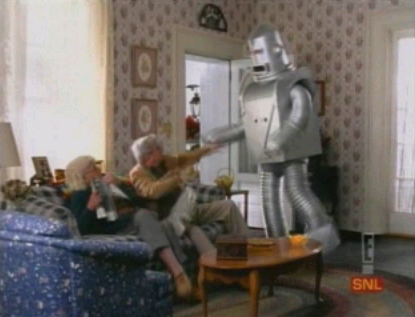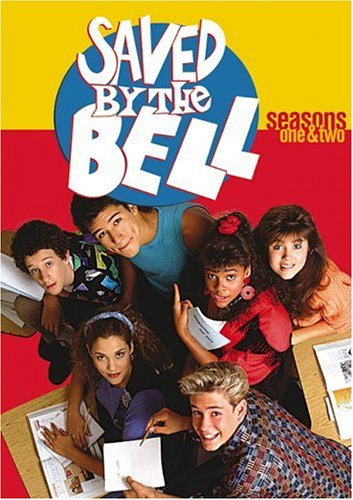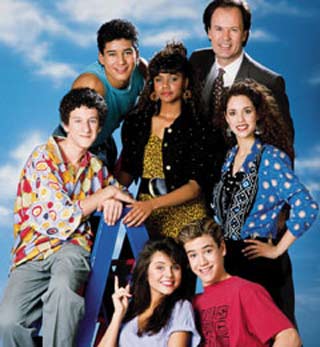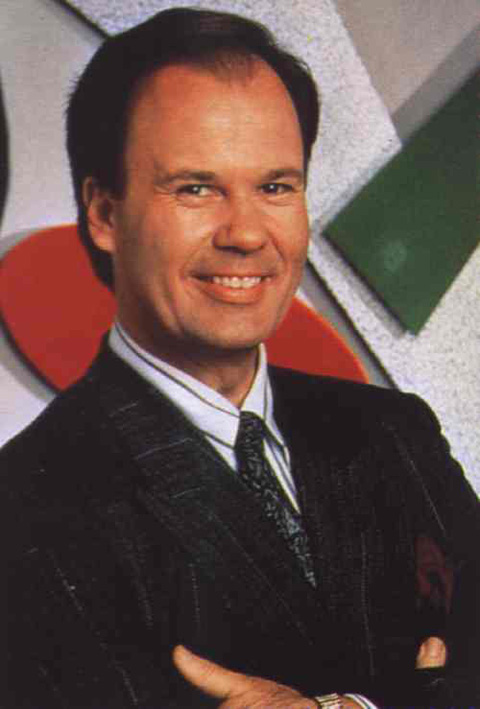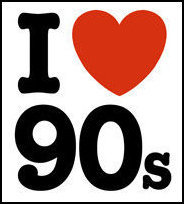
Sitting around today watching the entire cannon of Modern Family available to date on Hulu, I got to thinking about Ed O'Neill playing the patriarch of a dysfunctional family. I know, I know, it's sort of a stretch, but I'm almost certain I've seen this before. The patriarch part, that is.*
It just goes to show that Ed O'Neill was wasting his time playing all those hard-nosed detectives and policemen in the interim period. He was pretty much meant to be play this cliche of a former football-playing clueless bumbling dad. It's not typecasting, it's just logical selection.
Married with Children was one of those quintessential 90s shows that effectively captured the cynical sense of humor of a coming-of-age Generation X. The show focused on the Bundy family, a sort of white-trash take on the family situation comedies that flooded the airwaves in the 80s. Indeed, the show's working title while in production was Not the Cosbys. The Bundys truly were a form of anti-Cosby, a screwball comedy with a husband and wife team cut in the classic disparaging style of The Honeymooners.
While there was the occasional moment of heartwarming awwness, generally the show had a sort of hard cynical shell with which it reflected the negative side of family life. In a time when all family shows were happy family shows, Married with Children stood in stark contrast for its controversial humor. Because, you know, anything that doesn't reflect alleged good family values is immediately deemed subversive by middle America. Conservative family values-spouting critics with too much spare time needed to spout something, so a TV show featuring a humorously misanthropic title family seemed as good a target as any.

The tasteless humor and vulgar subject matter divided audiences, with some crying out against the lack of TV-grade perfection in the Bundy family and others laughing at the show's non-glossy take on the grittier side of family living. Like Al Bundy says, "When one of us is embarrassed, the others feel better about ourselves." As long as the Bundys were out there week after week humiliating themselves and bringing shame to their family names, the rest of us could seek comfort in the fact that at least our own families weren't that bad. It may not have been an outright victory, but instead a sort of consolation prize. Married with Children gave us the emotional equivalent of a lifetime's supply of Campbell's tomato soup. We may not win family of the year, but at least we've got something.
Even the intro gave us a tongue-in-cheek approach to the family sitcom, contrasting the sunny Sinatra tune "Love and Marriage" against the mundane images of our tasteless starring family:
Al Bundy (O'Neill), our (sort of) hero, was the family's mediocre breadwinner. Now awashed-up middle aged guy, Al had once been a talented high school football player with a bright future until he knocked up his then-girlfriend, now-wife Peggy. With dreams of college athletic scholarships dashed, Al settles for marrying Peggy and taking an unexceptional job as a shoe salesman at the mall. Al is nothing if not the picture of mediocrity, driving a crappy car, working a thankless and mindless job, and taking joy in bowling and watching TV in lieu of spending quality time with his family.
Al's wife Peggy (Katey Sagal) is an indifferent and inattentive woman who delights in outspending her husband's meager earnings and refusing to cook, claiming a fire allergy. Her daily quota of bonbons could support a chocolate-hungry small Caribbean nation, though she somehow manages to maintain her svelte figure. She's a vision in painted-on spandex pants, a fire engine-red bouffant hairstyle, and sky-high heels.
With parents like these, it's easy to see how these kids didn't grow up to be personified beacons of moral light. Their blonde bimbo daughter Kelly (Christina Applegate) is a dim-witted and ignorant teenager known for her promiscuity and complete lack of understanding of everything. Her brother, Bud, is slightly better off intellectually though he is not known for his luck with the ladies. He's something of a leader for a band of merry misfits.
Their neighbors weren't much better. In early seasons, the lived beside Marcy (Amanda Bearse) and Steve Rhoades (David Harrisson), a somewhat more upwardly mobile couple who both work as bankers. Marcy and Al became rivals, with the former delighting in the latter's misery at every turn. Unsurprisingly, she was Peggy's best pal. Harrison left the show to pursue his stage career was replaced with Marcy's second husband, Jefferson D'arcy (Ted McGinley) a slacker bartender whom she married unknowingly while drunk. See, it's just one big happy family after another.
The show was extremely popular, though it was often plagued by public controversy. A few episodes in particular fell under attack by angry viewers:
A Period Piece (AKA The Camping Trip):
Conveniently available in condensed minisode format for your viewing pleasure, here is the short version of the episode:
The Bundys go camping with their neighbors the Rhoades during which all of the females have their periods simultaneously. The references to menstruation were more than enough to push some critics over the edge, complaining over the show's lack of taste and non family friendly content. Hey, no one said your kids needed to watch it. Anyway, I watched it, and I turned out okay. Well, anyway, I watched it.
Her Cups Runneth Over
This episode also caught a lot of flack for questionable taste and subject matter. The episode centered on Peggy's disappointment that her favorite bra has been discontinued on her birthday. Al sets out to an obscure and risque lingerie shop to retrieve a new one and encounters a number of inappropriate intimate items.
Terry Rakolta, a suburban Detroit mother who caught her children enjoying (gasp!) this particular episode, made a major to-do over the show's theme and content. She took to national TV, imposing her whiny prudish schoolmarm views on the rest of us. Rakolta explained, ""I picked on Married...With Children because they are so consistently offensive. They exploit women, they stereotype poor people, they're anti-family. And every week that I've watched them, they're worse and worse. I think this is really outrageous. It's sending the wrong messages to the American family." Well, obviously. That's what makes a satire. It takes the messages and skews them. Someone get this woman a sense of humor.
I'll See You in Court

This episode never aired on Fox, proving too contentious for network TV. It was eventually released in the Season Three DVDs, but it's commonly known by fans as the "lost episode". Following the Rakolta crusade, Fox was especially cautious in its proceedings with Married with Children. "I'll See You in Court" followed Al and Peg as they escaped to an inn to reinvigorate their love life, only to find their neighbor's and their own sexual escapades being recorded on video by the sleazy motel. It sounds pretty tame right now, but in the wake of Terry Rakolta's tirade, it seemed better to be safe than sorry.
Despite our fair nation's uptight segment's penchant for engaging in the rectal conveyance of steel rods the show ran for an impressive 11 seasons, proving at least some of us still had a sense of humor. They told people it wasn't the Cosbys and people were angry that it wasn't the Cosbys. Go figure.
*Let it be known that Modern Family is totally new and awesome and not a rehashing of Married with Children. That is all.



